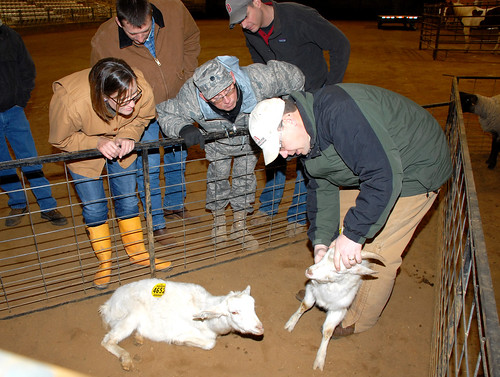Cooperative Extension Service providing food animal vet training to address need in rural areas
By Ryan McGeeney
U of A System Division of Agriculture
Sept. 21, 2018
Fast Facts:
- 24 courses designed to help address need for food animal vet services
- While there are plenty of veterinarians in the state, too few specialize in large animal/food animal vet services
- Courses are grant-funded, and free to attend
(583 words)
(Download this story in MS Word here)
LITTLE ROCK — The University of Arkansas System Division of Agriculture announced this week that it will offer the first of a series of educational seminars for veterinarian doctors and technicians designed to expand the availability of veterinarian services to producers raising large animals and other food animals.
Heidi Ward, veterinarian and Assistant Professor of Animal Science for the Division of Agriculture, will be directing a Food Animal Workshop Series for veterinarians throughout the state over the next two years, beginning in October. Ward received a National Institute of Food and Agriculture grant through the U.S. Department of Agriculture to fund the project, which she said aims to help shift available veterinarian resources toward producers in the state working with cattle and other food animals.
“My proposal was to take some of our small and mixed-animal veterinarians and retrain them to integrate more food animal medicine into their clinics,” Ward said.
“When we go to vet school, we learn both small and large animal medicine, but in the final year of school, we track more towards one or the other — and you tend to go where the money is.
“Veterinarians graduate with huge student loans, and of course, small animal care is in high demand, and pays more money,” she said. “That’s why a lot of people go into small animal medicine, even though they have the desire and intention to treat large animals. Then, over time, they lose that large animal education — a lot of them just need a little pep talk and perhaps a refresher to get back into it.”
Despite lacking its own in-state school of veterinary medicine, Arkansas is in no short supply of licensed veterinary doctors.
There are currently more than 980 veterinarians in Arkansas with active licenses, according to the Arkansas State Veterinary Medical Examining Board. But at least 13 counties in the state report a shortage of large animal vets, Ward said.
“That may mean they have one or none living in the county,” Ward said, “or it may mean they have access to a traveling large animal vet from a neighboring county, but that vet may already be serving four or five counties. It’s stressful for both the doctor and the producer.”
What courses will be offered?
The series will offer 24 workshops over a two-year period, with each workshop providing between three and seven continuing education units to veterinary doctors and technicians. To maintain their respective licenses, doctors need 20 hours of CEUs, technicians need six.
The first class, scheduled for Friday, Oct. 19, will focus on honey bee veterinary medicine. Most of the workshops will be hands-on, held at one of four locations throughout the state. Two of the courses, focusing on finance, will be available online.
Ward said the classes will largely focus on aspects of large animal veterinary medicine crucial to producers, such as performing field necropsies on dead animals in order to reduce or prevent the spread of disease, and palpating female cows to diagnose the stage and condition of pregnancies.
Ward said the teaching cadre for the workshops will be drawn Division of Agriculture staff, members of the Arkansas Veterinary Medical Association and from well-known veterinary experts throughout the country. The curriculum, which is still being designed, will be generated through the Division of Agriculture and the medical association, she said.
The workshops will be free to attend. To register, contact Heidi Ward at hward@uada.edu
To learn about the need for veterinary medicine in Arkansas, contact your local Cooperative Extension Service agent or visit www.uaex.uada.edu.
About the Division of Agriculture
The University of Arkansas System Division of Agriculture’s mission is to strengthen agriculture, communities, and families by connecting trusted research to the adoption of best practices. Through the Agricultural Experiment Station and the Cooperative Extension Service, the Division of Agriculture conducts research and extension work within the nation’s historic land grant education system.
The Division of Agriculture is one of 20 entities within the University of Arkansas System. It has offices in all 75 counties in Arkansas and faculty on five system campuses.
Pursuant to 7 CFR § 15.3, the University of Arkansas System Division of Agriculture offers all its Extension and Research programs and services (including employment) without regard to race, color, sex, national origin, religion, age, disability, marital or veteran status, genetic information, sexual preference, pregnancy or any other legally protected status, and is an equal opportunity institution.
# # #
Media Contact: Ryan McGeeney
Communication Services
U of A Division of Agriculture
Cooperative Extension Service
(501) 671-2120
rmcgeeney@uada.edu
